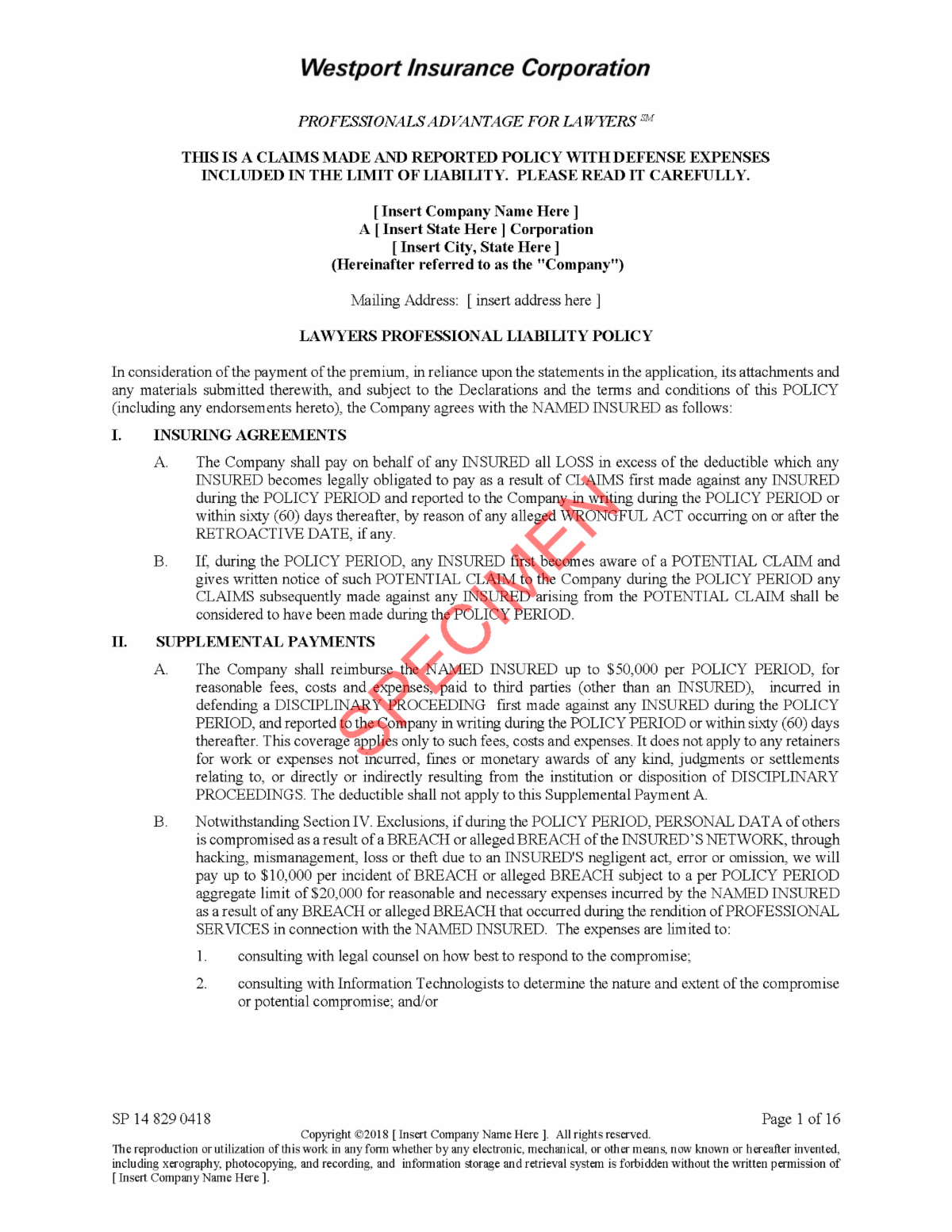
Attorney Malpractice Insurance Policies are claims-made and reported policies. When the coverage ends the ability to report claims for past acts ends at policy termination. Attorneys leaving private practice via retirement, becoming a judge or working in the private or public sector need to protect their past acts. Insurers will not renew attorney malpractice policies for attorneys that are no longer in private practice. Given this it is important for attorneys to protect their past acts once coverage ends. For solo practitioners and small firms that may close once the practitioner leaves, the nonpracticing Extended Reporting Period Endorsement/Retirement Tail (ERP) may be an answer.
Note: For attorneys closing or leaving their small firm to work at another law firm the nonpracticing Extended Reporting Period Endorsement/Retirement Tail (ERP) is not an option. Coverage for their past acts is outside of the scope of this blog.
Each insurer’s policy differs on requirements and wording for obtaining this valuable ERP endorsement at no or reduced cost. Careful planning by the attorney may save the attorney thousands of dollars. The ability to request an ERP differs by insurer but is time sensitive. Regardless of the insurer, the attorney must completely stop private practice to obtain the nonpracticing ERP.
The Westport policy provides a nonpracticing ERP based on the following policy language:
K. NON-PRACTICING EXTENDED REPORTING PERIOD OPTIONS
For all Non-Practicing Extended Reporting Period options listed below:
i. the coverage shall apply only to CLAIMS for WRONGFUL ACTS which occurred prior to the end of the POLICY PERIOD and on or after the RETROACTIVE DATE, if any, which are otherwise covered by the POLICY and which are first made against this INSURED and reported to the Company during this Non-Practicing Extended Reporting Period; and
ii. The extended reporting period does not extend the POLICY PERIOD. Any Non-Practicing Extended Reporting Period option shall be part of and not in addition to the last POLICY PERIOD. Non-Practicing Extended Reporting Period shall not in any way increase the limit of liability stated in the Declarations. Any CLAIM made during this Non-Practicing Extended Reporting Period shall be deemed to have been made during the immediately preceding POLICY PERIOD. The first sixty (60) days of the Non-Practicing Extended Reporting Period Option, if endorsed to the POLICY, shall run concurrently with the Automatic Extended Reporting Period.
1. Any individual owner, partner, officer, director, stockholder, shareholder or employee of the NAMED INSURED who, during the POLICY PERIOD, retires or voluntarily ceases, permanently and totally the private practice of law, shall be entitled, at no additional premium, to an unlimited period for reporting CLAIMS first made against this INSURED. The right to this retirement Non-Practicing Extended Reporting Period is subject to the following conditions:
a. the INSURED exercising the Non-Practicing Extended Reporting Period option has not had his or her professional license to practice law suspended or surrendered at the request of any disciplinary or regulatory authority;
b. the INSURED has been continuously insured by the Company and/or another lawyers professional liability insurance carrier for at least three full consecutive years;
c. the POLICY was not cancelled for non-payment of premium or non-renewed;
d. the INSURED exercising this option has complied with all of the terms and conditions of the POLICY; and
e. the INSURED gives written notification of retirement or the termination of the private practice of law within sixty (60) days after the termination date of the POLICY PERIOD.
This Non-Practicing Extended Reporting Period option is provided until the INSURED resumes the private practice of law.
2. Any individual partner, officer, director, stockholder, shareholder or employee of the NAMED INSURED who, during the POLICY PERIOD, retires or otherwise ceases the private practice of law, and who has not been continuously insured by the Company and/or another lawyers professional liability insurance carrier for at least three full consecutive years, shall have the right to extend the time for reporting CLAIMS first made against this INSURED per the following schedule. The additional premium for this Non-Practicing Extended Reporting Period shall be:
a. 12 months 100% of per lawyer annual premium of this POLICY
b. 24 months 150% of per lawyer annual premium of this POLICY
c. 36 months 185% of per lawyer annual premium of this POLICY
d. Unlimited 300% of per lawyer annual premium of this POLICY
This right to purchase this Non-Practicing Extended Reporting Endorsement is subject to the following conditions:
a. the license of the INSURED exercising the Non-Practicing Extended Reporting Period option to practice his or her profession has not been revoked, suspended or surrendered at the request of any disciplinary or regulatory authority for reasons other than the INSURED exercising the Non-Practicing Extended Reporting Period option becoming TOTALLY AND PERMANENTLY DISABLED, by the time that the right could be exercised;
b. the POLICY was not cancelled for non-payment of premium or non-renewed;
c. the INSURED exercising this Non-Practicing Extended Reporting Period option has complied with all of the terms and conditions of the POLICY;
d. the INSURED exercising this Non-Practicing Extended Reporting Period option must send written notice to the Company of the intention to purchase this Non-Practicing Extended Reporting Endorsement accompanied by the additional premium. The Company must receive written notice and premium payment no later than sixty (60) days after the termination date of the POLICY PERIOD.
3. If an INSURED dies during the POLICY PERIOD as a result of reasons other than self-inflicted injury, suicide, or alcohol or drug abuse, then the period for reporting CLAIMS is extended at no additional premium until the executor or administrator of the estate is discharged, provided that the estate, heir or administrator gives written notification and written proof of the date of death to the Company within 60 days of the death of the INSURED. The deductible requirement of the POLICY will be waived for CLAIMS first made against the INSURED during the Non-Practicing Extended Reporting Period.
4. If an INSURED becomes TOTALLY AND PERMANENTLY DISABLED during the POLICY PERIOD, and has been continuously insured by the Company for at least two (2) consecutive years, then the period for reporting CLAIMS is extended at no additional premium until the death of the INSURED or until the INSURED is no longer TOTALLY AND PERMANENTLY DISABLED, provided that:
a. the INSURED or the INSURED’S legal guardian provides written notice of the disability to the Company no later than sixty (60) days after the termination date of the POLICY PERIOD;
b. the INSURED or the INSURED’S legal guardian provides a physician’s written certification of the disability including the date the disability commenced; and
c. the INSURED agrees to submit to a medical examination at the Company’s expense by any physician(s) designated by the Company.
The deductible requirement of the POLICY will be waived for CLAIMS first made against the INSURED during the Non-Practicing Extended Reporting Period.
The additional premium and deductible requirement for this Non-Practicing Extended Reporting Period will be waived for an INSURED who is leaving the private practice of law to become either a state or federal judge.
III. DEFINITIONS
J. “INSURED” MEANS:
1. the NAMED INSURED;
2. any lawyer who is a past or present partner, officer, director, stockholder, shareholder, employee or “of counsel” of the NAMED INSURED, but only for PROFESSIONAL SERVICES rendered on behalf of the NAMED INSURED and only if a fee inured or would have inured (in the case of a contingency arrangement) to the NAMED INSURED for PROFESSIONAL SERVICES. No fee need inure to the INSURED for eleemosynary services performed with prior approval of the NAMED INSURED.
3. any lawyer listed in the application who is a partner, officer, director, stockholder, shareholder or employee of the NAMED INSURED at the time the CLAIM is made, but only for PROFESSIONAL SERVICES rendered by such individual while associated with a PRIOR FIRM;
4. any lawyer who has retired from the NAMED INSURED, but only for PROFESSIONAL SERVICES rendered prior to the date of retirement;
5. any past or present non-lawyer, employee or independent contractor attorney of the NAMED INSURED, but only for PROFESSIONAL SERVICES rendered on behalf of the NAMED INSURED; and
6. the heirs, executors, administrators and legal representatives of any INSURED, but only in their capacity as such in the event of any INSURED’S death, incapacity or bankruptcy, and only for CLAIMS based on PROFESSIONAL SERVICES rendered prior to such INSURED’S death, incapacity or bankruptcy, and only to the extent that such INSURED would otherwise be covered by this POLICY; and
7. the legal spouse or domestic partner of an INSURED but only for CLAIMS resulting from PROFESSIONAL SERVICES provided by any INSURED on behalf of the NAMED INSURED.
L. “NAMED INSURED” MEANS the person or entity listed in the Declarations and PREDECESSOR FIRM thereof.
Switching insurers near retirement to save a few dollars may cost an insured attorney thousands of dollars to buy the same protection. Planning retirement or a transition out of private practice should be discussed with your malpractice insurance agent prior to ending private practice when possible.
CLICK HERE TO OBTAIN AN ATTORNEY MALPRACTICE QUOTE

Lee Norcross, MBA, CPCU
(616) 940-1101 Ext. 7080